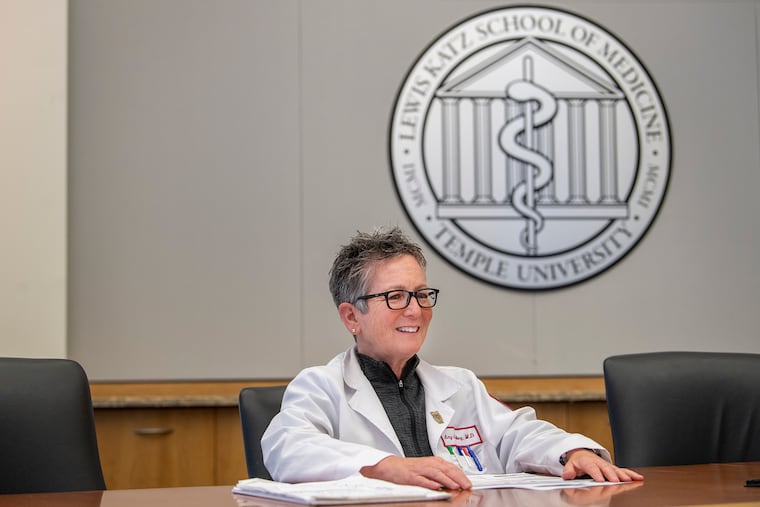Amy Goldberg is the first woman to lead Temple’s century old medical school, and she is celebrating women along the way
Amy Goldberg is the Lewis Katz School of Medicine's first female dean.

It took more than 120 years for Temple University to appoint the first woman dean of its medical school.
Now at the helm, Amy Goldberg is intent on using her new position to elevate and recognize other women. For her one-year anniversary as the dean of the Lewis Katz School of Medicine this October, she hosted a “celebration of Temple Health women.”
» READ MORE: Temple University celebrates a new medical school class with white coats and proud parents
Female employees heard health system leaders recognize their work, networked, and enjoyed food. The event was dedicated to JoAnne Epps, the beloved Temple University president who died in September. Goldberg hopes it will become an annual tradition.
“It was fabulous,” she said of the opportunity to recognize women, noting that many juggle childcare responsibilities in addition to their demanding jobs.
Goldberg views her role as a problem solver, helping to support the next generation of physicians through their medical education. The Inquirer spoke to Goldberg about medical school diversity, physician burnout, and her Philly-area roots.
Philly roots, Temple trained
Goldberg grew up in Broomall, a Delaware County suburb of the city, and has spent most of her education and career in Philadelphia.
She attended the University of Pennsylvania for college, and returned to Philadelphia for her surgical residency after medical school in New York City. Then she went to Baltimore for a year to gain subspecialty experience in trauma surgery, but knew she would be back.
“If I was going to be a trauma surgeon, there was only one place,” she said, “right here at Temple.”
A surgeon at Temple for 30 years, Goldberg has held multiple leadership positions, including chair of the department of general surgery. When John Daly died in 2021, Goldberg applied to succeed him as the dean of the medical school. She first held the position in an interim capacity and then, in fall 2022, was appointed as the full-time head of the school.
Diversity challenges
Goldberg feels a weight of responsibility in being the first woman leader of an institution that is over a century old.
“It definitely gives me a moment of pause, and empowerment,” she said.
Surgery is also a male dominated field, and there were even fewer women working in operating rooms and trauma bays when Goldberg started her career.
» READ MORE: How medical schools are considering race after the Supreme Court limited affirmative action in admissions
Now she oversees admissions policies crucial to cultivating diversity among the next generation of physicians, which became more challenging after the Supreme Court of the U.S. ruled last summer to end race-based affirmative action in university admissions. Goldberg is adamant that Temple continue to prioritize diversity.
“We can certainly follow all the laws and have a holistic approach to admission,” she said.
Burnout and compassion
Goldberg still works night shifts as a trauma surgeon, where most weeks she treats victims of Philadelphia’s gun violence crisis.
“It’s pretty grueling,” she said.
Goldberg thinks a core mission of the Temple Health community is combating inequities in care. She wants medical students to become compassionate physicians who understand the needs of their patients.
» READ MORE: Tired and frustrated, some Philadelphia nurses look for life and work outside hospitals
She also wants to prepare students for difficulties they will encounter on the job. Physicians are reporting high rates of burnout, and Goldberg wants to set up Temple students for successful careers. She tells students that it is OK to talk about whatever is stressing them out, whether school load, patient interactions, or anything else.
“I don’t want people sitting in silent desperation,” Goldberg said. “I want them to be able to reach out to each other, and reach out to us.”